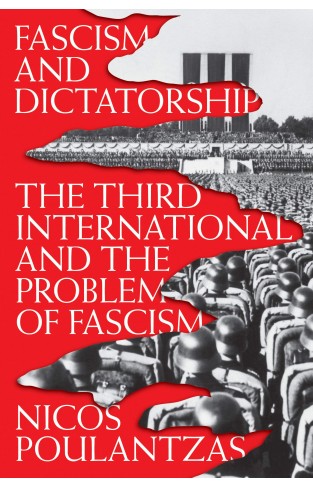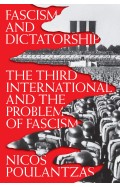- Home
- Non Fiction
- History
- Political
- Fascism and Dictatorship: The Third International and the Problem of Fascism
Fascism and Dictatorship: The Third International and the Problem of Fascism
By: Nicos Poulantzas
-
Rs 2,335.50
- Rs 2,595.00
- 10%
You save Rs 259.50.
Due to constant currency fluctuation, prices are subject to change with or without notice.
The resurgence of the far right across Europe and the emergence of the "alt-right" in the US have put the question of fascism urgently back on the agenda. For those trying to understand these forms of politics, there is no better place to start than Fascism and Dictatorship, the unrivalled Marxist study of German and Italian fascism. It carefully distinguishes between fascism as a mass movement before the seizure of power and what it becomes as an entrenched machinery of dictatorship. It compares the distinct class components of the counterrevolutionary blocs mobilised by fascism in Germany and Italy; analyses the changing relations between the petty bourgeoisie and big capital in the evolution of fascism; discusses the structures of the fascist state itself, as an emergency regime for the defence of capital; and provides a sustained and documented criticism of official Comintern attitudes and policies towards fascism in the fateful years after the Versailles settlement. Fascism and Dictatorship represents a challenging synthesis of factual evidence and conceptual analysis, a standard bearer of what Marxist political theory should be.
The resurgence of the far right across Europe and the emergence of the "alt-right" in the US have put the question of fascism urgently back on the agenda. For those trying to understand these forms of politics, there is no better place to start than Fascism and Dictatorship, the unrivalled Marxist study of German and Italian fascism. It carefully distinguishes between fascism as a mass movement before the seizure of power and what it becomes as an entrenched machinery of dictatorship. It compares the distinct class components of the counterrevolutionary blocs mobilised by fascism in Germany and Italy; analyses the changing relations between the petty bourgeoisie and big capital in the evolution of fascism; discusses the structures of the fascist state itself, as an emergency regime for the defence of capital; and provides a sustained and documented criticism of official Comintern attitudes and policies towards fascism in the fateful years after the Versailles settlement. Fascism and Dictatorship represents a challenging synthesis of factual evidence and conceptual analysis, a standard bearer of what Marxist political theory should be.
Fascism and Dictatorship: The Third International and the Problem of Fascism
By: Nicos Poulantzas
Rs 2,335.50 Rs 2,595.00 Ex Tax :Rs 2,335.50
Zubin Mehta: A Musical Journey (An Authorized Biography)
By: VOID - Bakhtiar K. Dadabhoy
Rs 630.00 Rs 1,050.00 Ex Tax :Rs 630.00
Who Speaks For Islam What A Billion Muslims Really Think
By: John L. Esposito
Rs 1,536.50 Rs 2,195.00 Ex Tax :Rs 1,536.50
Germany and Propaganda in World War I: Pacifism Mobilization and Total War
By: David Welch
Rs 1,437.00 Rs 2,395.00 Ex Tax :Rs 1,437.00
Myths Illusions and Peace: Finding a New Direction for America in the Middle East
By: Dennis Ross
Rs 985.50 Rs 1,095.00 Ex Tax :Rs 985.50
The Origins of Political Order From Prehuman Times to the French RevolutioN
By: Francis Fukuyama
Rs 3,505.50 Rs 3,895.00 Ex Tax :Rs 3,505.50
Reset: How This Crisis Can Restore Our Values and Renew America
By: Kurt Andersen
Rs 450.00 Rs 500.00 Ex Tax :Rs 450.00
How To Win A Cosmic War God Globalization And The End Of War
By: Reza Aslan
Rs 625.50 Rs 695.00 Ex Tax :Rs 625.50
Game Change Obama And The Clintons McCain And Palin And The Race Of A Lifetime
By: John Heilemann
Rs 715.50 Rs 795.00 Ex Tax :Rs 715.50
Made to Stick: Why Some Ideas Take Hold and Others Come Unstuck
By: Chip Heath & Dan Heath
Rs 2,695.50 Rs 2,995.00 Ex Tax :Rs 2,695.50
Who Speaks For Islam What A Billion Muslims Really Think
By: John L. Esposito
Rs 1,536.50 Rs 2,195.00 Ex Tax :Rs 1,536.50
Germany and Propaganda in World War I: Pacifism Mobilization and Total War
By: David Welch
Rs 1,437.00 Rs 2,395.00 Ex Tax :Rs 1,437.00
No recently viewed books available at the moment.
Zubin Mehta: A Musical Journey (An Authorized Biography)
By: VOID - Bakhtiar K. Dadabhoy
Rs 630.00 Rs 1,050.00 Ex Tax :Rs 630.00
Fascism and Dictatorship: The Third International and the Problem of Fascism
By: Nicos Poulantzas
Rs 2,335.50 Rs 2,595.00 Ex Tax :Rs 2,335.50
Who Speaks For Islam What A Billion Muslims Really Think
By: John L. Esposito
Rs 1,536.50 Rs 2,195.00 Ex Tax :Rs 1,536.50
Germany and Propaganda in World War I: Pacifism Mobilization and Total War
By: David Welch
Rs 1,437.00 Rs 2,395.00 Ex Tax :Rs 1,437.00














-120x187.jpg?q6)








-120x187.jpg?q6)






